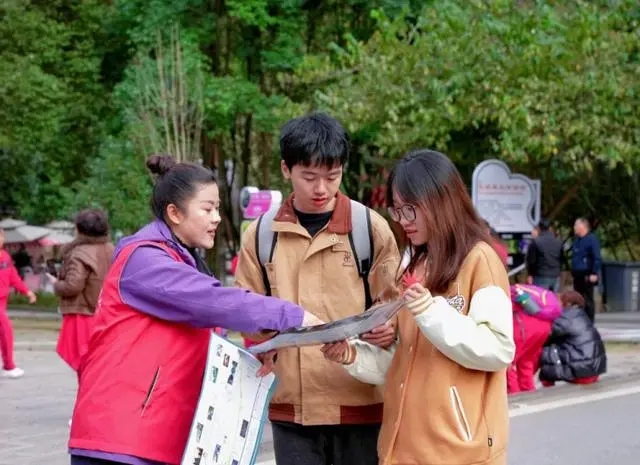Young people spearhead nationwide cultural tourism boom
Tourists have been flocking to Tianshui city in northwest China's Gansu Province in recent weeks, drawn by the allure of its famous malatang, a local street dish featuring a mix of fresh vegetables and meat boiled in a hot, spicy broth.
Yet, Tianshui has much more to offer. Eager to showcase their city, local college students have stepped up, offering recommendations for Tianshui's lesser-known delicacies and activities, significantly enriching the overall tourist experience.
A recent survey of around 3,500 college students conducted by China Youth Daily revealed that over 90 percent were eager to contribute to the development of culture and tourism. Specifically, 62 percent expressed a strong desire to support cultural and tourism initiatives in their hometowns or in the areas where they study and work, while 29 percent showed a moderate interest in such efforts.

A volunteer (left) provides tourists with information at Zhangjiajie National Forest Park in ZhangJiajie, central China’s Hunan Province. (Photo/China Tourism News)
When it comes to ways to participate, 73 percent of respondents expressed a desire to become volunteers, 63 percent would share their travel experiences through social media, and 63 percent would recommend local specialties to friends and online contacts. Additionally, 39 percent of respondents would offer suggestions and feedback to cultural and tourism departments and relevant authorities.
You Mengting, a student from Hunan University, has shared more than 100 travelogues on social media. Since last summer, she has used social media to promote the tourist destinations she has visited, such as Suzhou and Yangzhou in east China's Jiangsu Province. Her posts have gained immense popularity online, receiving over 10,000 likes and favorites.
The growing popularity of cities such as Xi'an, Nanjing, Xiamen, and Chengdu, as well as the increasing recognition of less-familiar destinations like Wuyuan, Yanji, and Datong, can be attributed to frequent sharing by young people on social media.
In addition to their active online promotion, some college students, like Zhao Wenyao, have joined cultural and tourism volunteer teams.
During his freshman summer vacation, Zhao volunteered at a 4A-level scenic area in his hometown of Ankang, northwest China's Shaanxi Province.
His primary duty was to maintain cleanliness in various parts of the scenic area, ensuring a neat and tidy environment for visitors. While carrying out his responsibilities, Zhao frequently encountered tourists seeking information, such as directions to specific attractions within the scenic area.
To ensure he could provide accurate and helpful answers, Zhao made a concerted effort to be well-informed, aiming to enhance visitors' experiences through his knowledge and personal experiences.
According to the survey, 34.73 percent of the respondents expressed an interest in working in the cultural and tourism industry or related fields.
Li Shujing, who obtained a master's degree from the Communication University of China, has been involved in the culture and tourism sectors for 10 years.
In 2021, Li, a member of the research team led by her mentor, conducted in-depth research on cultural preservation, inheritance, and utilization along the Yellow River.
"The overall revitalization and utilization of cultural resources in the Yellow River region is still limited. Our research experiences in these aspects provide a fresh perspective for studying culture and tourism," said Li.
Li began her research journey in Kaifeng city, located in central China's Henan Province. Renowned as an ancient capital of eight dynasties, Kaifeng boasts a rich history and abundant heritage.
Li discovered many of the folk legends circulating in the Yellow River region.
"If we take these legendary myths and develop them into cultural products such as movies, animations, novels, and games, we can build a cultural production system centered around Yellow River legend IP. By leveraging the cultural and industrial values, we can create new products and formats that embody the cultural essence of the Yellow River," Li suggested.
Photos
Copyright © 2024 People's Daily Online. All Rights Reserved.









